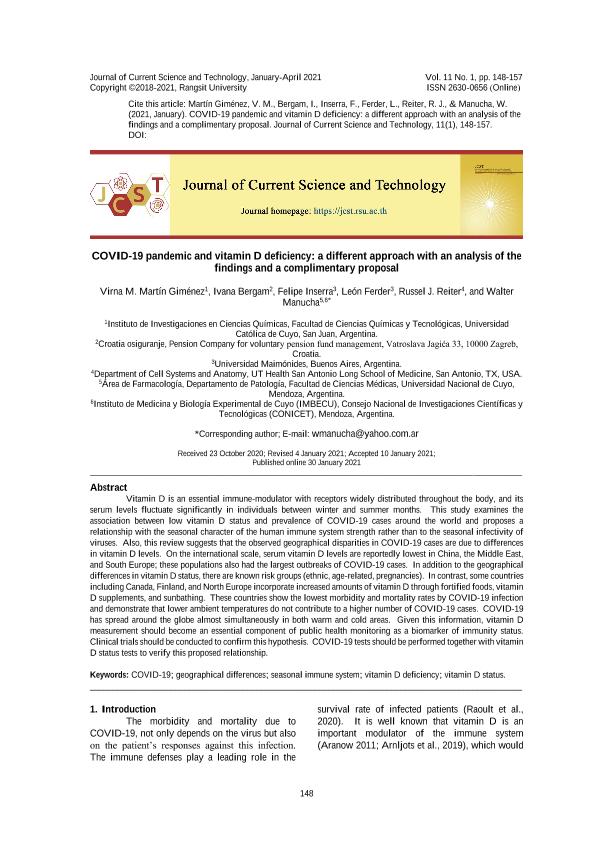Mostrar el registro sencillo del ítem
dc.contributor.author
Martín Giménez, Virna Margarita

dc.contributor.author
Bergam, Ivana
dc.contributor.author
Inserra, Felipe

dc.contributor.author
Ferder, Leon Fernando

dc.contributor.author
Reiter, Russel

dc.contributor.author
Manucha, Walter Ariel Fernando

dc.date.available
2021-06-30T20:45:20Z
dc.date.issued
2021-01
dc.identifier.citation
Martín Giménez, Virna Margarita; Bergam, Ivana; Inserra, Felipe; Ferder, Leon Fernando; Reiter, Russel; et al.; COVID-19 pandemic and vitamin D deficiency: a different approach with an analysis of the findings and a complimentary proposal; Rangsit University; Journal of Current Research and Technology; 11; 1; 1-2021; 148-157
dc.identifier.issn
2077-0383
dc.identifier.uri
http://hdl.handle.net/11336/135204
dc.description.abstract
Vitamin D is an essential immune-modulator with receptors widely distributed throughout the body, and its serum levels fluctuate significantly among individuals between winter and summer months (from 30 to 50%). This study examines the association between low vitamin D status and prevalence of COVID-19 cases around the world and proposes a relationship between the seasonal character of the human immune system strength rather than to the seasonal infectivity of viruses. Also, this review suggests the observed geographical disparities in COVID-19 infections were due to differences in vitamin D levels. On the international scale, serum vitamin D levels are reportedly lowest in China, the Middle East, and South Europe; these populations also had the largest outbreaks of COVID-19 cases. In addition to the geographical differences in vitamin D status, there are known risk groups (ethnic, age-related, pregnancies). On the contrary, some countries including Canada, Finland, and North Europe incorporate increased amounts of vitamin D through fortified foods, vitamin D supplements, and sunbathing. These countries show the lowest morbidity and mortality rates by COVID-19 infection and demonstrate that lower ambient temperatures do not contribute to a higher number of COVID-19 cases. COVID-19 has spread around the globe almost simultaneously in both warm and cold areas. Given this information, vitamin D measurement should become an essential component of public health monitoring as a biomarker of immunity status. Clinical trials should be conducted to confirm this hypothesis. COVID-19 tests should be performed together with vitamin D status tests to verify this proposed relationship.
dc.format
application/pdf
dc.language.iso
eng
dc.publisher
Rangsit University
dc.rights
info:eu-repo/semantics/openAccess
dc.rights.uri
https://creativecommons.org/licenses/by-nc-sa/2.5/ar/
dc.subject
COVID-19
dc.subject
GEOGRAPHICAL DIFFERENCES
dc.subject
SEASONAL IMMUNE SYSTEM
dc.subject
VITAMIN D DEFICIENCY
dc.subject
VITAMIN D STATUS
dc.subject.classification
Enfermedades Infecciosas

dc.subject.classification
Ciencias de la Salud

dc.subject.classification
CIENCIAS MÉDICAS Y DE LA SALUD

dc.title
COVID-19 pandemic and vitamin D deficiency: a different approach with an analysis of the findings and a complimentary proposal
dc.type
info:eu-repo/semantics/article
dc.type
info:ar-repo/semantics/artículo
dc.type
info:eu-repo/semantics/publishedVersion
dc.date.updated
2021-06-29T13:24:49Z
dc.identifier.eissn
2630-0656
dc.journal.volume
11
dc.journal.number
1
dc.journal.pagination
148-157
dc.journal.pais
Tailandia

dc.journal.ciudad
Patumthani
dc.description.fil
Fil: Martín Giménez, Virna Margarita. Universidad Catolica de Cuyo. Facultad de Ciencias Quimicas y Tecnologicas; Argentina. Consejo Nacional de Investigaciones Científicas y Técnicas; Argentina
dc.description.fil
Fil: Bergam, Ivana. Croatia Osiguranje Pension Company; Croacia
dc.description.fil
Fil: Inserra, Felipe. Universidad Maimónides; Argentina
dc.description.fil
Fil: Ferder, Leon Fernando. Universidad Maimónides; Argentina
dc.description.fil
Fil: Reiter, Russel. University Of Texas Health Science Center At San Antonio (ut Health San Antonio) ; University Of Texas At San Antonio; Estados Unidos
dc.description.fil
Fil: Manucha, Walter Ariel Fernando. Consejo Nacional de Investigaciones Científicas y Técnicas. Centro Científico Tecnológico Conicet - Mendoza. Instituto de Medicina y Biología Experimental de Cuyo; Argentina. Universidad Nacional de Cuyo; Argentina
dc.journal.title
Journal of Current Research and Technology
dc.relation.alternativeid
info:eu-repo/semantics/altIdentifier/doi/http://dx.doi.org/10.14456/jcst.2021.16
dc.relation.alternativeid
info:eu-repo/semantics/altIdentifier/url/https://jcst.rsu.ac.th/volume/11/number/3/article/208
Archivos asociados
